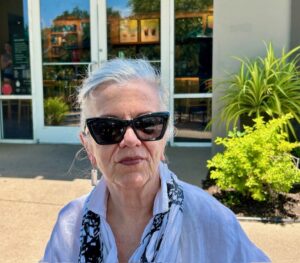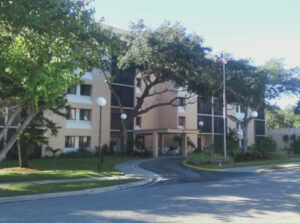Millions are affected and many could end up in the street, as HUD landlords now treat Medicare benefits as income.
By Victoria Kasdan
Original Air Date: June 14, 2024
Host: A recent shift in landlord practice threatens millions of low-income seniors and could end up throwing thousands on the streets. WSLR News reporter Victoria Kasdan talked to one Sarasota senior who fell into the “Medicare Advantage trap.”
Victoria Kasdan: Imagine being a 72-year-old with chronic health conditions, living on a fixed income in a rent-controlled building. You’re managing, but it’s tight. Then, out of the blue, your rent shoots up by a whopping 36%, all because of something seemingly unrelated: your health benefits.
That’s exactly what happened to Tina Steele, a five-year Casa Santa Marta Apartments resident in Sarasota. These near-downtown apartments are owned by St. Martha Catholic Church and managed by SPM, LLC. They are a lifeline for low-income elderly and disabled individuals like Tina.
Tina Steele: Very nice apartments. We’re in downtown Sarasota. We have central air, central heating. It’s a lovely apartment. And it has a small patio, which I call the catio, because I have two cats. And, at least when I first moved in, it was exceptionally well run.

Tina Steele. Photo: Kasdan
VK: As a Medicare recipient with an income at or below $20,000, Tina is eligible for both Medicare and Medicaid. She receives her health benefits from a Dual Eligible Special Needs Plan or D-SNP offered by UnitedHealthcare, the nation’s largest D-SNP carrier. Thanks to that, she relies on an over-the-counter benefit worth $220 a month. But here’s the catch: this benefit isn’t like a gift card; it’s strictly for health plan-designated essentials and can only be used at certain locations for things like band-aids, aspirin, cold medicine, and nutritional supplements.
Like all HUD tenants, Tina must pay 30% of her income as rent. With an income below Florida’s Medicaid annual maximum of $20,000, every dollar counts. So when her property management started treating this benefit as additional income, her rent shot up, making it even harder to keep up with expenses.
Tina’s situation goes beyond her own struggle; it sheds light on a nationwide policy shift that could negatively affect thousands. The implications are staggering. SPM — the company that runs Casa Santa Marta — manages over 200 buildings across 16 states, potentially putting thousands in Tina’s shoes. And it’s not just about the money; it’s about health and dignity. Tina, like many others, relies on her benefits to stay healthy. But now, she’s forced to choose between paying rent and taking care of herself.
To make matters worse, getting help proved to be an uphill battle for Tina. She was trapped in a bureaucratic nightmare despite reaching out to advocacy groups and government agencies. And when we tried to get answers from SPM and St. Martha’s Church, we were met with silence and deflection. In an emailed response to WSLR News questions, St. Martha’s communications director referred to a 2007 HUD statute, which has no apparent connection to the recent actions taken.

Casa Santa Marta II
After she surrendered her Medicare card, the SPM property manager made a call and directly obtained details on Tina’s specific benefits from her insurer. Tina was shocked. This felt like an invasion of her protected health information, and a violation of HIPAA.
But this isn’t just about one building or one policy. It’s about a system that’s failing its most vulnerable members. D-SNP programs like the one Tina relies on are supposed to provide essential support for those in need. Yet, instead of helping, they’re being used to justify rent hikes that could push people like Tina onto the streets.
TS: I can just about manage, but it’s taken my quality of life with it. They’re talking about relocating, but the most tragic of this is, you know, even people talking about suicide. Because they have no family, they have nowhere else to go. And they just don’t want to end up on the streets. Because you are talking about our most vulnerable. You’re talking about seniors. You’re talking about … It’s about people in their 80s, in their 90s, and people like myself in our 70s.
VK: According to a recent report by the Kaiser Family Foundation, a staggering 12.9 million individuals were covered under both Medicare and Medicaid, and dual-eligible plan enrollment accounted for 46% of all dual-eligible individuals. These plans frequently offer additional supplemental benefits to address gaps in care, encourage care coordination, and improve health outcomes for economically disadvantaged people who often have serious high-risk medical conditions.
D-SNP programs are growing rapidly, and enrollment in the number of individuals eligible and the percentage of those enrolling in such plans nearly tripled between 2010 and 2021.
We reached out to Representative Greg Steube, the Republican Congressman for Sarasota, as well as other Florida congresspeople. We also reached out to the HUD regional office in Jacksonville and the federal department in charge and Medicare and Medicaid. We did not hear from either by deadline.
Reporting for WSLR News, this is Victoria Kasdan.
WSLR News aims to keep the local community informed with our 1/2 hour local news show, quarterly newspaper and social media feeds. The local news broadcast airs on Wednesdays and Fridays at 6pm.